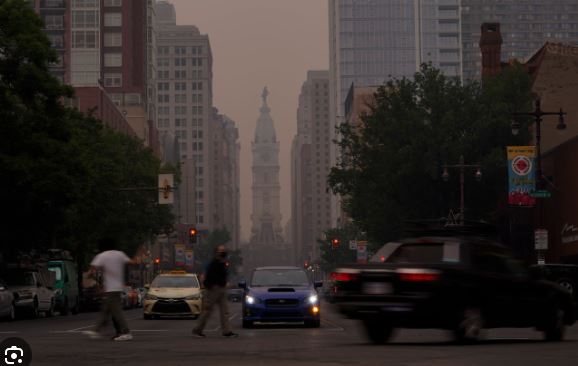Pennsylvania - Residents of Pennsylvania should be prepared for a Code Orange Air Quality Action Day on Monday, as announced by the Department of Environmental Protection (DEP). This designation means that air quality conditions are expected to be unhealthy for sensitive groups, and individuals are advised to take necessary precautions to protect their health.
The DEP closely monitors air quality across the state to
ensure the well-being of its residents. When air pollution levels are forecasted
to reach unhealthy levels, the DEP issues air quality alerts to inform the
public and encourage them to take appropriate measures. A Code Orange alert
signifies that certain individuals, such as children, the elderly, and those
with respiratory or heart conditions, may be particularly affected and should
limit their outdoor activities.
The primary cause of Code Orange days is often elevated
levels of ground-level ozone or particulate matter in the air. These pollutants
can arise from a variety of sources, including vehicle emissions, industrial
activities, and natural factors like wildfires or dust storms. When atmospheric
conditions, such as high temperatures and stagnant air, combine with these
pollutants, they can lead to reduced air quality.
It is crucial for individuals to be proactive in
safeguarding their health during Code Orange days. Here are some recommended
actions to mitigate the impact of poor air quality:
Limit outdoor activities: Reduce exposure to pollutants by
avoiding strenuous outdoor exercise or work, especially during the hottest
parts of the day when pollution levels tend to be highest.
Stay indoors: Seek shelter in air-conditioned environments,
such as homes, offices, or public buildings, where air filtration systems can
help reduce exposure to outdoor pollutants.
Close windows and doors: Keep windows and doors shut to
prevent outside air, especially if you live or work near major roadways or
industrial areas.
Use air purifiers: Consider using air purifiers with HEPA
filters to improve indoor air quality. These devices can help remove harmful
particles from the air.
Follow medical advice: If you have a pre-existing
respiratory or heart condition, consult your healthcare provider for specific
guidance and recommendations during periods of poor air quality.
Stay informed: Stay updated on air quality conditions through local news, weather apps, or websites provided by environmental agencies. Be aware of any changes or updates to the air quality forecast.
It's important to remember that everyone can play a role in
reducing air pollution and protecting the environment. By adopting eco-friendly
practices like carpooling, using public transportation, and conserving energy,
we can collectively contribute to cleaner air and healthier communities.
The DEP continues to monitor air quality conditions and will
provide updates as necessary. The safety and well-being of Pennsylvania
residents are of paramount importance, and by taking appropriate precautions
during Code Orange Air Quality Action Days, we can help minimize the potential
health risks associated with poor air quality.
Let us all do our part to ensure cleaner air for ourselves
and future generations. Stay safe, informed, and take care of your health.





